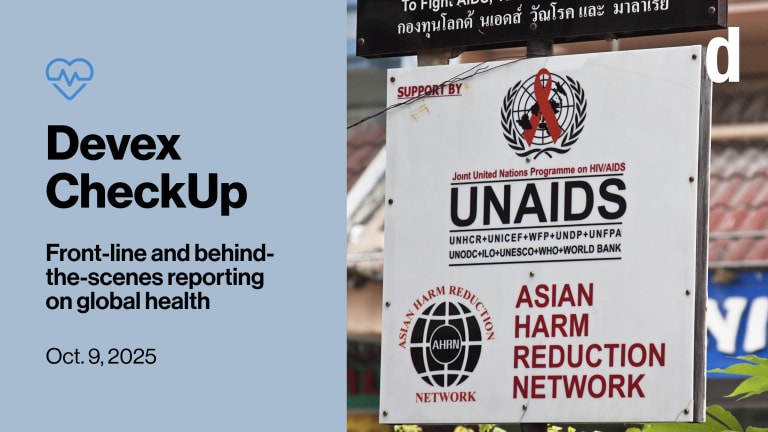
Released Wednesday, a report by the Independent Panel for Pandemic Preparedness and Response found delays in China’s confirmation of clusters of “unusual pneumonia” — what we now know as coronavirus cases — to the World Health Organization. But according to panel co-chair Helen Clark, China wasn’t the only country with delays.
This is a preview of Devex CheckUp
Sign up to this newsletter for exclusive global health news and insider insights, in your inbox every Thursday.
We look at the panel’s recommendations and what they mean for COVID-19 and future pandemics.
• The panel called to establish a new alert and surveillance system for outbreaks, allowing WHO to immediately dispatch investigators and publish information without countries’ approval.
• Member states have failed to adequately fund WHO, and funding for pandemic preparedness and responses is “too often too little and too late,” says Ellen Johnson Sirleaf, panel co-chair and former president of Liberia.
• The report stops short of holding specific governments, organizations, or individuals accountable for failures in the COVID-19 response, “perpetuating the dysfunctional WHO tradition of diplomacy over frankness, transparency and accountability,” Lawrence Gostin, a Georgetown University professor and global health law expert, tells Jenny.
Read: WHO 'needs more powers' says independent panel co-chair Helen Clark
Level best
After countries delayed taking concrete steps to mitigate COVID-19 before it was officially declared a pandemic, some have proposed creating a new, intermediate alert level that would raise the alarm about public health concerns before they become international emergencies. But following an investigation, an International Health Regulations review committee concluded this wouldn’t change much. Here’s why:
Pros: Such alerts may encourage cross-border transparency before travel restrictions become potential concerns.
Cons: Countries are already ignoring the health recommendations they receive, and a new alert level wouldn’t address noncompliance.
Read: Pros and cons of a mid-alert system
Global health job of the week
Infection Prevention and Control Supervisor (COVID-19 Intervention)
Médecins Sans Frontières
Mumbai, India
Shots, shots, shots
One of the independent panel’s immediate recommendations is for high-income countries to share 1 billion COVID-19 vaccine doses with lower-income nations by September. Meanwhile, vaccine scarcity and inequity are being felt around the world.
• In Brazil, where there is another deadly surge of cases, politicians and the private sector are desperate for more vaccine access. A new bill seeks to authorize businesses to purchase and distribute doses, but public health experts are concerned this would leave behind the most vulnerable people.
• As countries begin to receive more vaccines, they will inevitably have to start dealing with distribution challenges — key among them being limited cold chain storage capacities. Hesitancy surrounding vaccines that don’t need to be kept ultracold may exacerbate those needs, Rumbi Chakamba reports.
• Vaccine hesitancy in Caribbean territories could also lead to vaccine waste. With 900 of the island's doses expiring at the end of May, Montserrat’s governor and premier delivered an “urgent appeal” for increased inoculation last week. Alison Kentish reports for CheckUp.
Register: Join us for daily conversations during the upcoming World Health Assembly, with exclusive interviews, expert analysis, and insider coverage of the week’s most important discussions.
The CheckUp Q&A:
The U.S. decision on the intellectual property waiver is game-changing, CEPI CEO Richard Hatchett tells Andrew Green.
What was your reaction to the announcement that the U.S. is willing to enter into negotiations on waiving intellectual property protections for COVID-19 vaccines?
The U.S. decision to enter into discussions around an IP waiver, that is absolutely game-changing. However that plays out, whatever kind of waiver — narrowly or broadly construed — gets negotiated, hopefully it will add to the global vaccine capacity. That's why we're talking about it.
But it’s not going to increase vaccine production in the near term or even in the midterm. That is something, realistically, you're talking about a change in vaccine production 18 months to two years from now. While there will be tremendous energy around focusing on that aspect of it, what I think is important is that it is a very strong signal that business as usual isn't adequate to the problem we face.
What are those other opportunities that will address immediate vaccine equity problems?
Everyone's not awake to the fact that we have to seriously focus on ending the pandemic globally. We also have to address the supply chain challenges. We've got to accelerate vaccine tech transfers that are already underway and do everything we can to optimize the manufacturing process, which hasn't been fully optimized.
That's all in a COVID context. The IP waiver discussion is the flip side of the coin with ongoing discussions about the need to expand manufacturing capacity and the willingness of international financing institutions to put substantial amounts of money on the table to increase manufacturing.
Join us Tuesday: Find out what the data can tell us about the future of health financing in a Devex Pro Live event on May 18.
What we’re reading
A rare fungal infection is affecting recovered COVID-19 patients in India. [BBC]
A COVID-19 variant first reported in India has now been found in 44 countries. [Al-Jazeera]
There is a severe oxygen shortage in Nepal as COVID-19 cases surge. [The Guardian]










